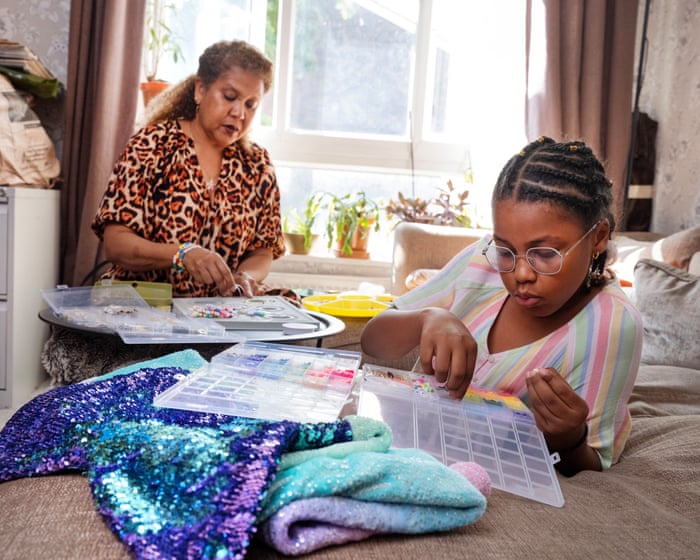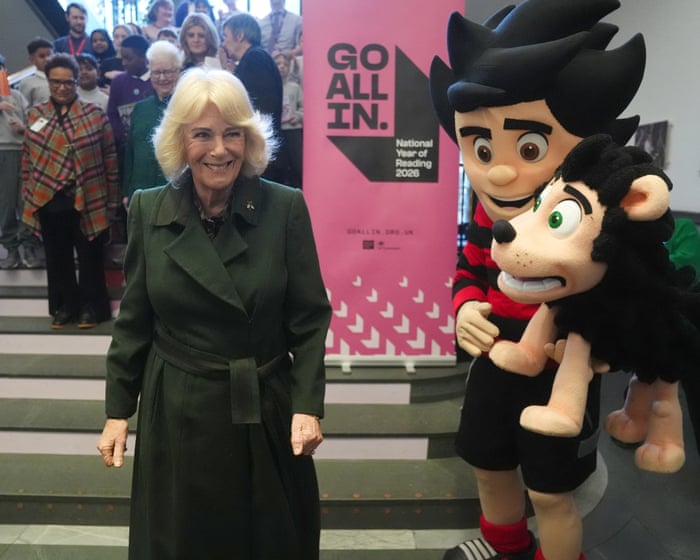When I first called Rita Labiche-Robinson, a 59-year-old retired project manager, she couldn’t talk because she was busy with her nine-year-old granddaughter, Nia. Rita cares for Nia two days a week—Thursdays and Fridays—but even though it was Tuesday when I called, they live together along with Nia’s mother, so she was still too occupied to chat.
The three of them have shared a home since March last year, when Rita’s daughter and granddaughter moved back from Canada. “While they wait for housing, they’re staying with me,” she explains. On her childcare days, Rita gets Nia ready for school—just a 10-minute walk from their home in Hackney, east London—then picks her up in the afternoon, makes her dinner, and reads to her before bed.
“It keeps me active,” Rita says. Nia even teaches her grandma about TikTok. And as Rita sees it, if someone else were paid to look after Nia, she’d be “missing out on watching her granddaughter grow up.”
Rita is one of millions of UK grandparents who, due to longer life expectancy, changing family dynamics, and the soaring cost of childcare, are taking on a level of care that resembles parenting. A 2017 report estimated that 9 million British grandparents—dubbed the “grey army”—spent an average of eight hours a week helping with childcare. A 2023 survey found that over half of UK grandparents provide some form of childcare during the workweek, averaging more than four hours a day.
Of course, that still leaves nearly half who don’t help—I know many parents whose own parents don’t lift a finger, let alone change a nappy. And why should they? They’ve already raised their kids—and those northern lights won’t see themselves.
But visit any playgroup or toddler music class, and you’ll find at least one grandparent shaping playdough or shaking a tambourine. Push a swing at the park, and you’ll likely be near another grandparent doing the same. As I write this, there’s a grandparent downstairs in my own home playing monster with my child so I can work. Both sets of my daughter’s grandparents have provided regular and last-minute care since she was born. Without them, my partner and I would have struggled—financially and emotionally.
Through community groups, charities, word of mouth, and a Guardian callout, I’ve spoken to dozens of grandparents who care for their grandchildren—handling school runs, sleepovers, movie nights, and baking sessions. Some have moved closer to their grandchildren, while others have had their children relocate nearby with the promise of childcare support. So why do they do it?
For many, the answer is simple: they love it. Anita Pollack and Phil Bradbury left their home in east London after 50 years to be near their grandchildren in Essex. “Though we’d both looked forward to having grandchildren, neither of us expected the overwhelming love we’d feel for them,” Anita says.
Others take joy in supporting their adult children. Alan Foster, 75, from West Sussex, never knew his own grandfathers, so when his grandson was born, he spent a month living with his daughter to help her transition back to work. “That way, she could ease into it gradually, and I could bond with my grandson before he started nursery,” he explains. He did the same when his second grandchild arrived.
There’s also an awareness of the pressures modern parents face. “We’re in awe of how our children juggle work and parenting, plus the cost of childcare, so we’re happy to help however we can,” says Martin Roach, who’s retired. He and his wife have cared for their grandchildren every Wednesday—starting at 7 a.m.—for years.Martin Roach says he’s in awe of his children’s responsibilities and is happy to help with childcare.
Some grandparents I’ve spoken to say that spending time with young children later in life gives them the freedom they didn’t have when raising their own kids. Maria, a retired childminder from Manchester, explains: “We don’t have the same stress or pressures we had when our children were young. Now we can just enjoy being with them.” Wendy, 77, who cares for her two grandsons weekly in Guildford, adds: “Being a grandparent is better than being a parent—there’s less worry.”
Of course, such close involvement can sometimes cause tension. Differences in parenting styles often arise—after all, many aspects of childcare today are very different from how this generation raised their own children. A 2021 study of British grandmothers found some were surprised by modern expectations, like constant supervision.
In my home, as in many others, sugar is a frequent point of conflict. My mum might say, “She’s eaten well today,” before listing off a cheese toastie, cake, and “a bit of Grandad’s Twix bar.” Screen time can also be a struggle—how many episodes of Bing is too many? While everyone agrees grandparenting is rewarding, it also comes with its share of responsibility.
Some grandparents find today’s “gentle parenting” approach challenging. One anonymous Guardian reader shared: “I have no problem telling my grandchild when they’ve done something wrong. When my four-year-old granddaughter pushed her friend, I made her apologize right away—her mother would have preferred to talk it through and ask why she did it.”
If grandparents are providing free childcare, is it fair to expect them to follow their children’s parenting ideals? After all, they’re not professional caregivers.
Despite these challenges, the benefits outweigh the drawbacks for everyone involved, says Anna Rotkirch, a Finnish sociologist who studies aging and families. “Children with strong grandparent relationships tend to have fewer difficulties,” she explains. During tough times—like a divorce—”a close bond with a grandparent acts as a resilience booster.” A grandparent’s home can provide stability when life with parents gets rocky.
Denise Burke, who runs the thinktank United for All Ages with her husband Stephen, also cares for her eight-year-old grandson Ardy weekly. “It’s not just about childcare—it’s what Ardy gains from it,” she says, mentioning trips to local restaurants and pubs. “He gets along well with our friends, and I think mixing with different ages is great for kids.”
For grandparents, childcare offers mental stimulation, structure, and purpose in retirement. John Perry and his wife drive their 10-year-old granddaughter Eva to school most days in Bingham, Nottinghamshire. Eva has even helped him master supermarket self-checkouts. “She’ll say, ‘Oh, Grandad, just give it to me,’ scan everything, and then ask for my card,” he laughs.
John L. Bazalgette, an 89-year-old from southwest London with 13 grandchildren, puts it simply…Here’s a more natural and fluent version of your text while keeping the original meaning intact:
—
The Wisdom of Caring for Children Across Generations
Looking after children can create a shared wisdom between generations. When we realize we may have similar feelings—especially in trying to find our place in a fragmented world—it can lead to deep bonds of love and attachment.
Some believe caring for grandchildren keeps people young, but a 2022 study found no real “rejuvenating effect.” What matters most is whether the care feels like a burden. Carole Easton, a psychotherapist and CEO of the Centre for Ageing Better, says many grandparents feel obligated: “I’m not sure how they’d manage without us.” It’s not necessarily a complaint, she explains, but an acknowledgment that they don’t truly have a choice.
Many grandparents also juggle work while caring for their grandchildren. Olga Grünwald, a researcher in the Netherlands, studies the ups and downs of grandparenting. She notes that for this “sandwich generation”—balancing work and childcare—people often say, “Oh, it’s rewarding,” but there’s also a lot of pressure.
One English teacher (who prefers to remain anonymous) invites her three grandchildren over every Friday night. “My job is demanding, and I’m often exhausted by the end of the week,” she says. “But my grandchildren bring me so much joy—they lift me up before I finally collapse on the couch!”
A 2022 survey by the childcare app Bubble found that one in four grandparents retired early to help with childcare. “That’s not a real choice,” Easton points out. “We’re losing experienced older workers, which hurts both the economy and workplaces.”
Some grandparents express frustration when part-time childcare turns into full-time. Many admit they’ve asked too much of their own parents, who were too kind to say no. One retired grandmother says of her daughter: “I’ve helped her earn a good salary, but I’ve never been paid a penny for it.”
Frances Stadlen, a 76-year-old writer and gardener in West London, set clear boundaries with her son when he started a family. Having been a stay-at-home mother, she wasn’t willing to commit to regular childcare. That doesn’t mean she doesn’t welcome her grandchildren—her home is full of toys and books, and she gives them her full attention during their weekly visits.
“I see this stage of life as a chance to pursue things I put aside earlier,” she says. “Society often undervalues older women’s right to step away from domestic life if they choose.”
Some grandparents struggle to find time for their own interests or feel guilty when they do. John Perry and his wife, Veronica, love traveling to their caravan in France, but because of their commitments, they only go for a week at a time—never during school holidays. “We’re always around,” he says.
—
This version keeps the original meaning while making the text smoother and more natural to read. Let me know if you’d like any further refinements!Grandparents often step in to help with childcare when needed. But this heavy involvement might not be necessary if childcare costs weren’t so high. In the UK, childcare is among the most expensive in the world. According to the charity Coram, summer holiday clubs this year cost parents an average of £1,075 per child—a 4% increase from 2024, with some areas seeing hikes as high as 13%.
When grandparents are forced into this role due to unaffordable childcare, something may be lost. Paula Carter, a 59-year-old retired nurse, adores her grandchildren and enjoys a close bond with them, but she also misses simply being “the granny.”
In Finland, where childcare costs are subsidized and capped at around €300 (£260) a month, grandparents are seen as “the dessert of life”—offering joy without the burden. Anna Rotkirch explains that in Nordic countries, grandparent care is occasional—an evening here, a few days when a child is sick—not daily, hours-long commitments.
High-quality, affordable childcare would allow grandparents to step in by choice, not necessity. They could enjoy time with their grandchildren—bringing treats and stories—rather than filling gaps in a broken system, which many find exhausting. My own parents love spending time with my daughter and find it rewarding, but they’re relieved our arrangement is now more flexible than the old routine of full days, from breakfast to bedtime.
Easton, who happily cares for her grandson, jokes that “a woman shouldn’t have a baby until she checks with the grandparents first.” The serious point? Grandparents are now such a key part of childcare that their role should be considered from the start.
Labiche-Robinson, deeply invested in raising her granddaughter Nia, says she’ll always be involved: “While I’m here, I might as well help the family.”
What do you think? If you’d like to share your views in a letter (up to 300 words), please email us.



